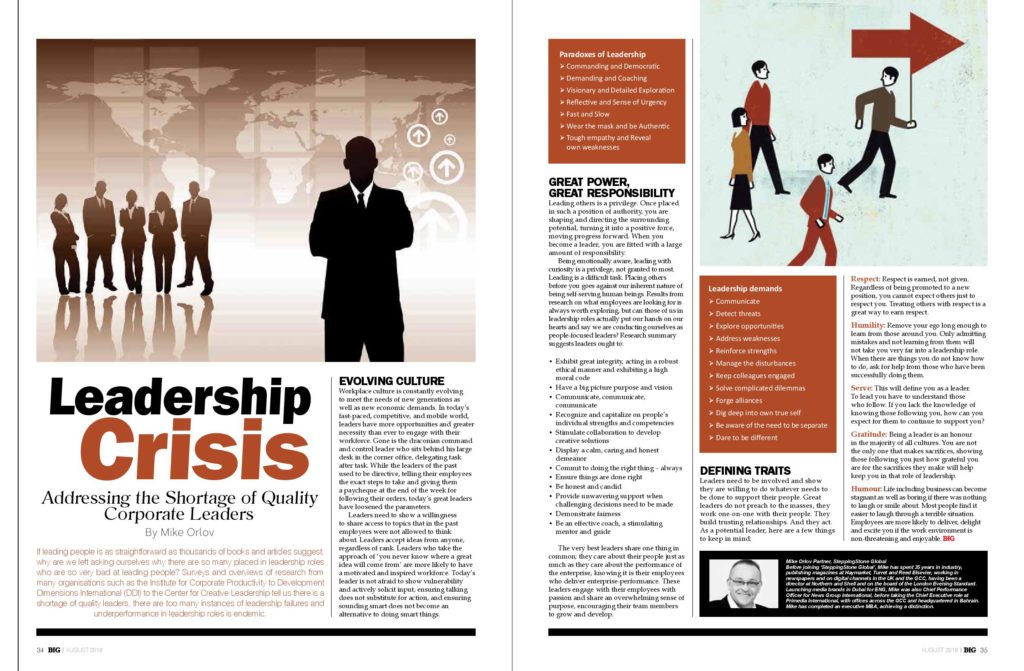
Leadership Crisis
If leading people is as straightforward as thousands of books and articles suggest, we are left asking ourselves why are so many placed in leadership roles so very bad at leading people? Surveys and overviews of research from many organizations such as the Institute for Corporate Productivity to Development Dimensions International (DDI) to the Center for Creative Leadership tell us there is a shortage of quality leaders, there are too many instances of leadership failures and underperformance in leadership roles is endemic, with low marks given to many leadership development efforts.
Workplace culture is constantly evolving to meet the needs of new generations as well as new economic demands. In today’s fast-paced, competitive, and mobile world, leaders have more opportunities and greater necessity than ever to engage with their workforce. Gone is the draconian command and control leader who sits behind his large desk in the corner office, delegating task after task.
While the leaders of the past used to be directive, telling their employees the exact steps to take and giving them a paycheck at the end of the week for following their orders, today’s great leaders have loosened the parameters. Leaders need to show a willingness to share access to topics that in the past employees were not allowed to think about.
Leaders accept ideas from anyone, regardless of rank. Leaders who take the approach of ‘you never know where a great idea will come from’ are more likely to have a motivated and inspired workforce. Today’s leader is not afraid to show vulnerability and actively solicit input, ensuring talking does not substitute for action, and ensuring sounding smart does not become an alternative to doing smart things.
Leading others is a privilege. Once placed in such a position of authority, you are shaping and directing the surrounding potential, turning it into a positive force, moving progress forward. When you become a leader, you are fitted with a large amount of responsibility.
Being emotionally aware, leading with curiosity is a privilege, not granted to most. Leading is a difficult task. Placing others before you goes against our inherent nature of being self-serving human beings.
Results from research on what employees are looking for is always worth exploring, but can those of us in leadership roles actually put our hands on our hearts and say we are conducting ourselves as people-focused leaders. Research summary suggests leaders ought to:
- Exhibit great integrity, acting in a robust ethical manner and exhibiting a high moral code
- Be authentic
- Have a big picture purpose and vision
- Communicate, communicate, communicate
- Recognize and capitalize on people’s individual strengths and competencies
- Stimulate collaboration to develop creative solutions
- Display a calm, caring and honest demeanor
- Commit to doing the right thing – always
- Ensure things are done right
- Be honest and candid
- Demonstrate a sense of urgency
- Be reliable
- Provide unwavering support when challenging decisions need to be made
- Demonstrate fairness
- Be an effective coach, a stimulating mentor and guide
- Direct employees to help them get “unstuck”
The very best leaders share one thing in common; they care about their people just as much as they care about the performance of the enterprise, knowing it is their employees who deliver enterprise-performance These leaders engage with their employees with passion and share an overwhelming sense of purpose, encouraging their team members to grow and develop.
Leaders need to be involved and show they are willing to do whatever needs to be done to support their people. Great leaders do not preach to the masses, they work one-on-one with their people. They build trusting relationships. And they act.
Respect: Respect is earned, not given. Regardless of being promoted to a new position, you cannot expect others just to respect you. Treating others with respect is a great way to earn respect
Humility: Remove your ego long enough to learn from those around you. Only admitting mistakes and not learning from them will not take you very far into a leadership role. When there are things you do not know how to do, ask for help from those who have been successfully doing them
Serve: This will define you as a leader. To lead you have to understand those who follow. If you lack the knowledge of knowing those following you, how can you expect for them to continue to support you?
Gratitude: Being a leader is an honor in the majority of all cultures. You are not the only one that makes sacrifices, showing those following you just how grateful you are for the sacrifices they make will help keep you in that role of leadership
Humor: Life including business can become stagnant as well as boring if there was nothing to laugh or smile about. Most people find it easier to laugh through a terrible situation. Employees are more likely to deliver, delight and excite you if the work environment is non-threatening and enjoyable.
VESA
Vision
Energy
Strategy
Authority
ROCHE
Resilience
Optimism
Confidence
Hope
Enthusiasm
Paradoxes of Leadership
Commanding and Democratic
Demanding and Coaching
Visionary and Detailed Exploration
Reflective and Sense of Urgency
Fast and Slow
Wear the mask and be Authentic
Tough empathy and Reveal own weaknesses
Leadership demands
Craft strategy
Communicate
Show stickability
Detect threats
Uncover challenges
Explore opportunities
Address weaknesses
Reinforce strengths
Manage the disturbances
Address thorny problems
Ride the constant turbulence
Keep colleagues engaged
Solve complicated dilemmas
Forge alliances
Cobble together resources
Dig deep into own true self
Be aware of the need to be separate
Dare to be different
Be a sense-making star
